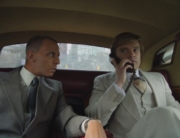Pablo Escobar is probably history’s most successful, and notorious, drug dealer/narcoterrorist. At its height, his Colombian cocaine empire made $60 million of business a day. He long ago reached a rarified level of cultural ubiquity. So the new film Escobar: Paradise Lost seems a bit gratuitous. Yet oddly enough, this is the first major dramatic film depicting Escobar, although he was portrayed in a small part in Johnny Depp’s Blow back in 2001. There is a law enforcement-centered drama starring Bryan Cranston due out next year that covers the Escobar saga, and several other projects that have been languishing in development may see the light of day soon. But Escobar, while heavily fictionalized, is first out of the gate, and with Benicio Del Toro playing Escobar, may prove to be the definitive version.
Del Toro’s Escobar is the very personification of excess—his beard is enormous, his gut is enormous, everything about him is larger than life. He doesn’t seem evil or even all that threatening. He comes across more as a natural leader to whom people look for direction and strength. One could say he has simply organized Colombians to utilize their natural resources, which happens to include cocaine at the top of the list, to raise the standard of living for everyone. If you were in his good graces, life improved dramatically for you and your family.
However, he did not live in a vacuum, and his massive cocaine operation had severe implications in the larger world. As idealistic as he may appear in using coca leaves to pay for schools and hospitals in poor towns, he was as unflinchingly cold-blooded and murderous in protecting himself and his interests when things got hairy.
At first, Escobar comes across so well because we only see him dropping in and out of the life of the protagonist, a completely fictional Canadian surfer named Nick (Josh Hutcherson). Escobar remains largely an avuncular, cheerful, somewhat mysterious presence who just wants everyone to be happy.
Nick and his brother audaciously have relocated to the idyllic Colombian beachside, sleeping in hammocks, and giving surfing lessons. Nick quickly falls in love with a lovely local, Maria (Claudia Traisac), and is touched by the warmth of her large family. He has a nice talk with her uncle, Escobar, and casually mentions how some local tough guys assaulted him for refusing to pay protection money. Things gradually spiral out of control from there.
The way that evil is depicted, comfortably lurking alongside quotidian ease, recalls Breaking Bad at its best, as does Nick’s transformation from a sweet young man to something eerily close to late-period Jesse Pinkman. The film likewise makes excellent use of a circular storytelling structure, as did Bad. Hutcherson uses his wholesome, boyish nature to great effect in presenting as an ideal match for Escobar’s beloved niece, and you can see why the Escobar clan accepts him into their fold. But he also excels in rising to the challenges of a reluctant man of action as the film progresses.
The movie combines a certain sleek, economic style with a densely packed narrative, full of incidents, almost epic in scope, but that sleekness gets a bit lost in the bloated and drawn-out final section. Another thing preventing the movie from joining the pantheon of great crime films are the thinly drawn supporting characters. Beyond Escobar, Nick, and Maria, no one else in the large cast is given much in the way of characterization. This lessens the tension when the bullets start to fly towards the end, as the viewer is not invested in each character’s fate.
Escobar: Paradise Lost tells an engrossing, tragic story of a man who was viewed as a national hero to some and the devil incarnate to others. The roller coaster between extremes of good and bad takes a devastating toll on Nick and Maria, showing what it’s like to be close to a chaotic human force of nature.







Leave A Comment